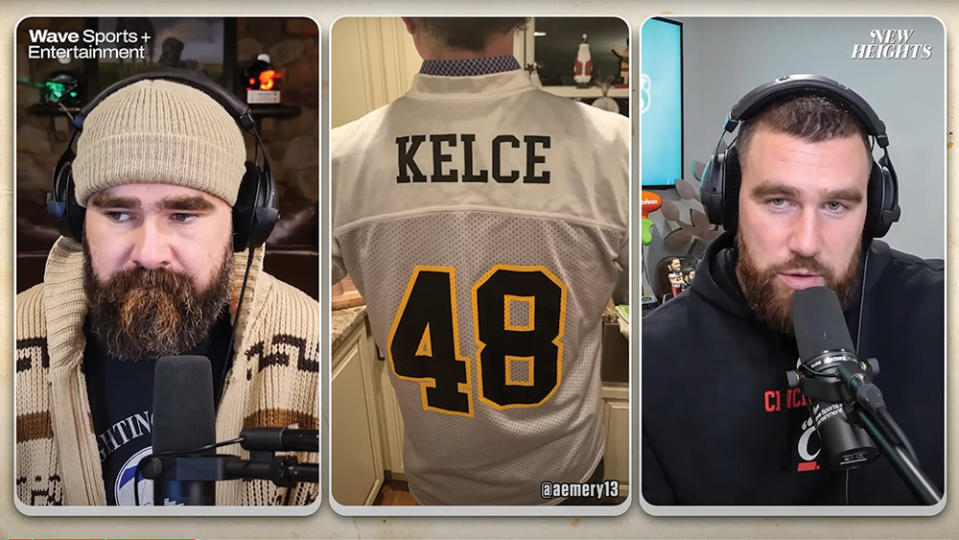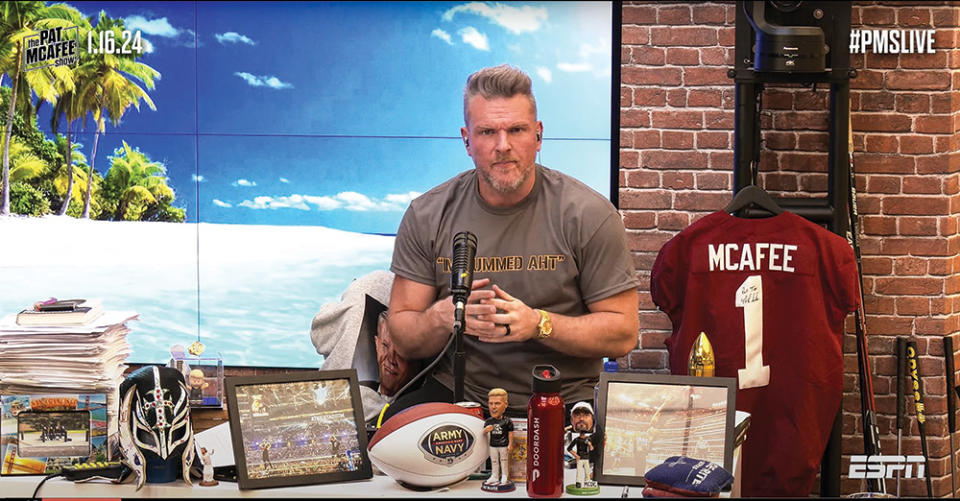In Sports Media, Athletes Now Run the Show — and Bring Upheaval

By 2018, Will Compton, a 28-year-old backup linebacker on a one-year contract with the Tennessee Titans, knew his playing days were numbered. Contemplating a career after football, he considered going into real estate or coaching but couldn’t muster much enthusiasm for either. Driving home after a game one evening, he called Taylor Lewan, an offensive tackle for the Titans and his closest friend on the team, with whom he’d just done a postgame segment on Titans Radio. The two, who had bonded over their fondness for podcasts like The Joe Rogan Experience, had undeniable chemistry on the air, and the experience got them thinking about starting their own podcast. For Lewan, who had just signed a six-year deal with the Titans, it sounded like a fun time. For Compton, it was a go-for-broke career plan. The following year, they launched Bussin’ With the Boys.
The only podcast of note by an active athlete at the time was basketball player JJ Redick’s show, launched in 2016. In football, there was no precedent. Essentially winging it, Compton and Lewan devoted 20 minutes of their first episode to the intricacies of using toilet paper. “I just felt like, all of our conversations in the sauna, the cold tubs around the locker room, the cafeteria table — if we could find that rhythm, people would enjoy the banter,” says Compton, who retired from the NFL last year.
More from The Hollywood Reporter
L.A. Times' Billionaire Owner (and His Family) Ignite a Tug-of-War Over Paper's Future
The Vultures Are Circling: Who Will Walk Away With Paramount?
Unconstrained to football, the show shattered the stereotype of the tight-lipped, cliché-spouting athlete. Twenty episodes in, Barstool Sports acquired the podcast. Now, Bussin’ With the Boys boasts 2 million-plus social followers (including 444,000 YouTube subscribers) for a show that records mostly in a 1970s Bluebird bus turned bro-cave. In its wake, active athlete-led video podcasts have proliferated across the sports landscape, including ones by Los Angeles Dodgers all-star Mookie Betts and the Golden State Warriors’ Draymond Green and, most prominently, the chart-topping New Heights, with brothers Jason Kelce of the Philadelphia Eagles and Travis Kelce, the Kansas City Chiefs tight end (and Taylor Swift paramour). The ad revenue and endorsement deals that can reward the most successful athlete-driven pods can easily amount to seven figures.
Not long ago, athletes looking to lay the groundwork for a post-playing career in media would wait for a network executive to ask them to sit in for a TV or radio spot during a bye week. If they were good at it, they could hope one day to get a regular gig as a broadcast analyst or commentator and, in the unlikeliest of cases, cross over to the nonsports world, like Good Morning America co-host Michael Strahan. The few slots available tended to go to big names, and whoever got them had to conform to the networks’ buttoned up standards. That model has become far less attractive to players, especially given the minimal cost of starting their own podcast, on their own terms.
“The democratization of distribution has given people that were not superstars an opportunity to differentiate themselves, to show their personalities,” says Michael Klein, whose Silver Tribe Media manages several athlete-led podcasts, including Bussin’ with the Boys, and Dale Earnhardt Jr.’s pod network Dirty Mo Media.

The U.S. men’s national soccer team defender Tim Ream, who co-hosts The American Dream on the Men in Blazers Media Network, agrees. “It’s nice to be able to just sit back and have a more laid-back, relaxed conversation or question and answer but at the same time, go on random tangents,” he says.
Compton and Lewan attribute the current athlete-podcast gold rush to The Pat McAfee Show, the phenomenally successful podcast licensed by ESPN last year for a reported $85 million. “Media is changing so much and Pat McAfee is the reason why this is happening,” says Lewan of the similarly unfiltered, tank top-favoring former NFL punter, who has publicly butted heads with ESPN over controversial and potentially libelous statements that NFL great Aaron Rodgers, a frequent (paid) guest, made on the show. That ESPN declined to chastise him suggests the network needs him more than he needs it, and that its executives believe the freewheeling, dressed-down format is the future of sports entertainment. “To me, the buttoned-up, suit-and-tie days are slowly dying, if not already dead,” says Lewan. “Broadcasting is great because you get to be involved in the game, but it doesn’t bring the camaraderie that everybody misses.”
The format allows sports figures to be more forthcoming than they would be when speaking to journalists. “Active athletes can tell you things that you’re not going to get from anybody else, whether it’s behind the scenes in the locker room or how coaches draw plays,” says Spencer Brown, founder of Cadence13, which launched Redick’s podcast in 2016. “You feel like you’re eavesdropping on a conversation.”

But while a podcast is easy to start, it’s hard to maintain, especially during the playing season. “The most impactful podcasts are the ones that are that are described as always on,” says Klein. “And always on is usually around 40 episodes a year. It’s really hard to do less than that and generate an audience.” Keeping to the schedule fans expect requires a level of commitment not given to every player, even if they have the talent for it. In the end, the odds of breaking out like Bussin’ with the Boys or New Heights are not necessarily better than in the old broadcast model.
“They have to be engaging personalities and being willing to put the time in, because it’s a grind to do it,” says Joe Favorito, a sports media consultant and professor at Columbia. “The ones that do the best are those that are part of an affiliate media network” — like Barstool or ESPN. “They’re not doing it on their own, just hoping that people find them.”
Whether the podcasts blow up, they can build a following and serve as a launching pad for a media career. In November, Sam Mewis, a midfielder for the National Women’s Soccer League and the U.S. Women’s National Team, announced the end of Snacks, the soccer and pop culture podcast she launched two years ago with teammate Lynn Williams. On Jan. 19, Mewis announced that she would retire from professional soccer and join Men In Blazers as editor in chief of its women’s vertical. “It feels like this thing … showed us this could be a career,” Mewis said in the final episode of Snacks. “It showed us we could be good at other things.”
This story appeared in the Jan. 18 issue of The Hollywood Reporter magazine. Click here to subscribe.
Best of The Hollywood Reporter

 Yahoo News
Yahoo News 
